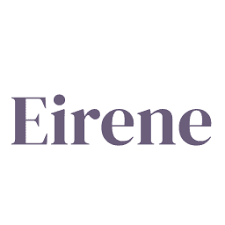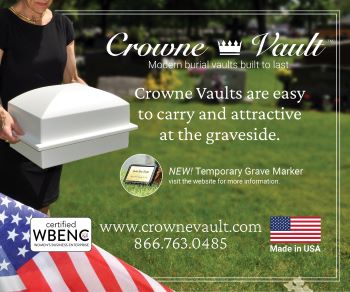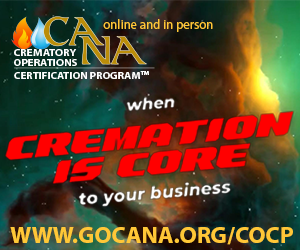A couple of choices for future success in the death care space
 Now that I’ve finished reporting on the quarterly reports of the large “established” companies in the death care realm, I thought it would be interesting to give my insight on a couple of companies that I think have a great potential to “grow” into larger companies or services in the future.
Now that I’ve finished reporting on the quarterly reports of the large “established” companies in the death care realm, I thought it would be interesting to give my insight on a couple of companies that I think have a great potential to “grow” into larger companies or services in the future.
And while Tribute Technology reportedly just sold for over $1 billion, you will probably see that my short list is a little light in, what would generally be considered the “technology” space. I think my thought process on that is two-fold . . . . 1) I’m a little old school and not real up to date on all the technology out there and . . . . 2) Most of the “technology” that I have seen in the funeral home area relates to that technology helping the funeral director in their every day performance on the job and not on the consumer and how, or why, they might select a funeral service or funeral service provider, going forward.
In any regard, I’ve become bullish on the following companies or services that I believe will have consumer demand or success going forward.

Eirene — cremation services provider from the digital world: Eirene, a Canadian company, allows consumers to make arrangements for their loved ones from an easy format on an electronic device. In this article from the Toronto Sun, the company states, “Eirene has streamlined the funeral planning process to cover everything from transportation to cremation — even delivering the ashes of loved ones to your doorstep — all in one seamless, dignified transaction.”
The article also states that the service is only available in the Toronto area at this time but has launched with success, during the pandemic, and expects to go nationwide in Canada in the near future.
At first glance it appears that the service provided is very similar to United States based Solace Cremation or Tulip Cremation. However, from my point of view there is a big difference in that Solace and Tulip seem to be chasing the “absolute low cost direct cremation consumer”, and Eirene seems to be about providing a flat rate for that next level of consumer. . . one between “absolute lowest cost” and what we would call “normal cremation pricing”.
Now, even as I believe that there is a market for “absolute lowest possible cost” as Solace and Tulip seem to be going after, I question if a contest on who can provide that will come at such a low margin that there is very little profit to ramp up the dollars that will be needed for “customer acquisition costs” in expanding the brand. Eirene, for what they term “Concierge services” has a flat price of US$ 1,925 ($2500 Canadian) while Solace advertises an $895 price point and Tulip, in the California market advertises prices between $750 and $1650.
With that point of view, I believe that a consumer sometimes looks at the price and says, “That’s too low. . . there has to be a catch to it.” It reminds me of the fate of the old Yugo automobile which was introduced to the American public in 1986 at a retail price point of $3,990. . . less than half the price of any other new automobile at the time. While they sold a few cars, it didn’t last long. As one buyer commented, “it’s hardly a car at all”.
I believe that while there is a market for the Yugo or for the “lowest possible cost direct cremation”, there is even a bigger market for a “moderate” priced direct cremation service provider that can guarantee certain results.
Finally, I like to tell the story of a friend who was the CEO of a public cell phone company and sat with me on a regional board of Wells Fargo back in the 1990s. I subscribed to his cell phone service, a service that was eventually sold to Verizon. One day I asked him why I had to sign up for a 2-year subscription service and his answer was the first 13 months of the 24 month contract simply covered the advertising and marketing costs to acquire me as a customer. Covering that “customer acquisition cost” as they roll out nationwide is something these cremation companies have to cover going forward or they will go the same way as the Yugo.
I think low and/or moderate cost direct cremation is going to rise in demand by the consumer. However, in the highly fragmented, and increasingly competitive, death care industry, these new web based cremation service companies are going to have to spend heavily to pull that clientele away from the local funeral home brands to grow. In essence, customer acquisition costs will be high. I think Eirene realizes that and is pricing themselves accordingly.

Parting Stone — creating a new category in cremation memorialization: I recently read this article that stated that Parting Stone received $100,000 in funding from The Arrowhead Innovation Fund based in Las Cruces, NM. The Arrowhead Innovation fund is a “fund of funds” totaling $2 million in commitments from the following areas — $800,000 from New Mexico’s Catalyst Fund, $500,000 from the New Mexico State University Foundation, and $300,000 as a grant from the U.S. Economic Development Administration, and more from private investors.
 The funds for the company which is already in revenue mode, will increase the staffing level from eight to 12 people among other growth objectives. The article also mentions that part of the funding will go towards educating the public about this process to bring it to common knowledge.
The funds for the company which is already in revenue mode, will increase the staffing level from eight to 12 people among other growth objectives. The article also mentions that part of the funding will go towards educating the public about this process to bring it to common knowledge.
The new category in the cremation memorialization field that has been created by founder Justin Crowe is what is termed as “Solidified Remains”. Crowe’s process allows for cremation “ashes” to be transformed into “clean, touchable solids that can be kept in a pocket or on a desktop.”
After learning of this process and comparing it to keeping an urn on a shelf, I think the Parting Stone concept makes lots of sense. The end result of the process produces about 20-25 small stones that can be buried or, most likely, kept by family members in their homes. And, as compared to “ashes” in an urn, these stones can be touched and handled giving the survivors a more intimate relationship with their deceased loved one.
What sold me on this company or process is when I mentioned it to a Minnesota gentleman about 80 years old. He told me that his parents were buried in Illinois and it has been a long time since he has been able to visit the graves to pay respects. He then said, “I wish I had those stones in my house now. They would give me a way to feel closer to my parents.”
Those comments helped me realize that it would not just be a younger. more mobile demographic who may be consumers of this product, but it would also allow a way for older people who lose spouses to “feel closer” to that spouse as they age in senior complexes or assisted living complexes.
And, because of Parting Stone’s multiple sales channels, any funeral home owner can get in on what may be the popularity of this process. Simply by becoming a funeral home retailer of the product, your funeral home can profit off Parting Stone’s potential demand also.
# # # #
Enter your e-mail below to join the 1,803 others who receive Funeral Director Daily articles daily:





















Thank you, as a relatively new organization in the death care industry we are always interested to hear about alternative trends such as ours at Life Forest in New Hampshire.